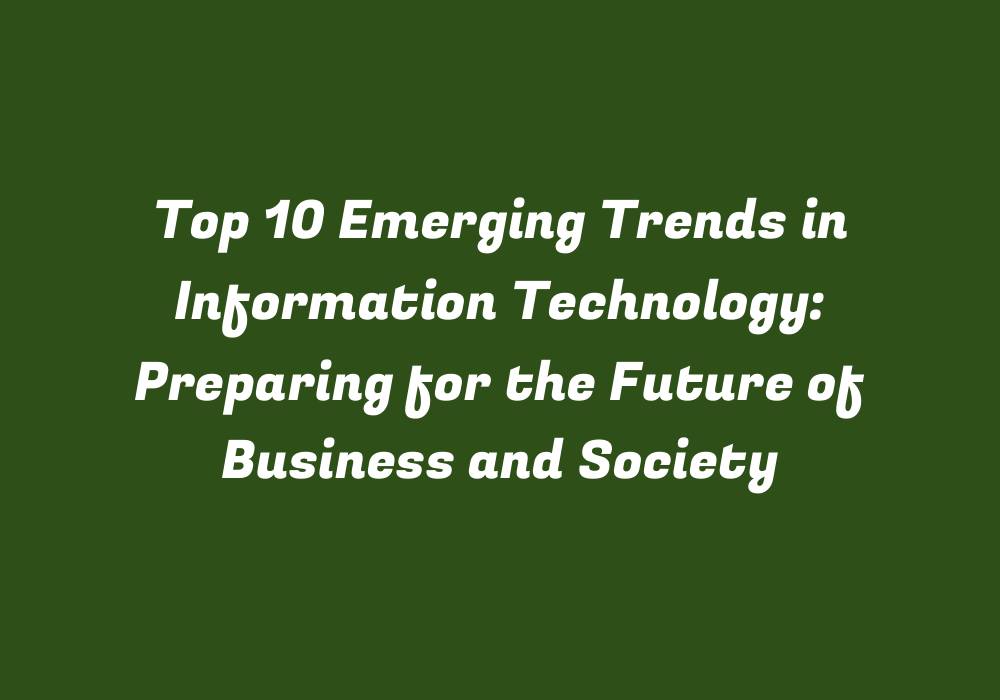Top 10 Emerging Trends in Information Technology: Preparing for the Future of Business and Society
Information technology has constantly evolved throughout the past few decades, transforming our world at a rapid pace. Today, we are witnessing the rise of innovative and disruptive technologies that will shape the future of business and society as a whole. To keep up with the rapidly changing landscape, it is crucial to stay aware of emerging trends in information technology. Here’s our list of the top 10 emerging IT trends you need to prepare for:
Artificial Intelligence (AI)
Artificial Intelligence is perhaps one of the most talked-about technological advancements. It aims at building machines that can mimic human intelligence, enabling them to perform various tasks effectively. In business, AI has already transformed industries such as healthcare and finance by automating processes, enhancing data analysis, and streamlining decision-making. As AI continues to evolve, we will witness its impact on every industry, changing the way we live and work in the future.
Cloud Computing
Cloud computing has revolutionized how organizations store, manage, and access their data. It involves utilizing remote servers instead of local hardware for data storage, software application hosting, and other IT services. As businesses are increasingly looking to improve efficiency, reduce costs, and enhance scalability, cloud computing is poised to become an essential part of corporate infrastructure.
Blockchain Technology
Blockchain technology has the potential to revolutionize several industries by providing a secure, transparent, and immutable way to record transactions and share information. With its decentralized nature, blockchain can significantly reduce risks associated with fraud or data manipulation. In business, blockchain will empower new types of transaction models, smart contracts, and improved supply chain management.
Cybersecurity
As the world becomes more interconnected, the importance of cybersecurity is on the rise. With cyberattacks becoming increasingly sophisticated and prevalent, businesses need to ensure they are adequately protected. This means implementing advanced security measures such as multi-factor authentication, encryption technologies, and real-time threat detection systems to safeguard against potential data breaches or cyber threats.
Internet of Things (IoT)
The Internet of Things refers to the interconnected network of physical devices that can collect and exchange data via the internet. This technology is rapidly gaining traction in various industries, enhancing efficiency, improving user experiences, and enabling new business models. As more devices become connected and capable of gathering valuable data, organizations need to understand how they can leverage IoT technology to provide value for their customers and optimize internal processes.
Augmented Reality (AR)
Augmented Reality is a technology that enhances the user’s real-world experience by layering virtual information, graphics, or effects onto physical objects. With increasing advancements in AR technologies, businesses can improve customer experiences and enhance training programs, among other applications. As this trend grows, companies need to consider how they can incorporate augmented reality into their offerings to provide added value for customers and employees alike.
Virtual Reality (VR)
Similar to AR, Virtual Reality creates an entirely virtual environment that users can interact with. This technology has found widespread adoption in various industries such as entertainment, education, and healthcare, providing immersive experiences that were previously impossible. In the future, VR will continue to evolve, offering even more realistic and engaging experiences for consumers and businesses alike.
3D Printing
3D printing is an innovative technology that has transformed manufacturing by enabling companies to produce complex designs with increased speed and efficiency. With the ability to manufacture products in a wide range of industries, from automotive to healthcare, 3D printing is becoming increasingly popular for rapid prototyping and personalized manufacturing. Organizations need to stay abreast of the evolving capabilities of this technology to determine how they can incorporate it into their processes and offerings.
Automation
As machine learning, robotics, and process automation continue to advance, businesses are finding ways to streamline tasks and optimize efficiency. By leveraging automation technologies, companies can reduce errors, improve productivity, and enhance customer satisfaction. However, it is essential for organizations to understand the ethical implications of such automation in order to create a balance between efficiency and human involvement.
Digital Transformation
Ultimately, digital transformation involves integrating technology into every aspect of an organization’s operations. As businesses look for ways to adapt to rapid technological changes and stay ahead of the competition, it is crucial to focus on embracing innovation and fostering a culture that encourages continuous learning. By investing in technology-driven strategies, companies can future-proof their businesses and better serve their customers in a rapidly changing world.
In conclusion, as we move towards an increasingly interconnected and technologically advanced society, it is important for individuals and organizations to be aware of emerging IT trends that will shape the future of business and society. By keeping up with these innovations and understanding how they can benefit your organization, you can position yourself for success in a rapidly evolving digital landscape.
